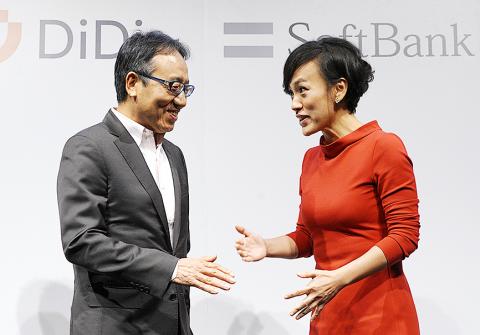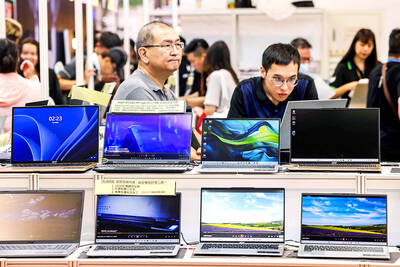Chinese mobile service giant Didi Chuxing (滴滴出行) and Tokyo-based Softbank Corp have set up a joint venture for taxi hailing in Japan.
The companies yesterday announced the plan for a service that uses artificial intelligence and data analysis on a technology platform available for free to all taxi companies in Japan.
The service would roll out later this year, starting with a trial run in Osaka, and expanding to Kyoto, Fukuoka, Okinawa and Tokyo, they said.

Photo: AP
The move marks the arrival of a major Chinese mobile transportation platform in a nation that has resisted ride-sharing businesses and protected its traditional taxi companies.
The joint venture would mainly target the growing legions of Chinese tourists in Japan.
Didi president Jean Liu (柳青) told reporters that she has long been impressed with Japanese cab services.
The Didi service in Japan would be “inclusive and collaborative,” not disruptive, and would work as a plus for taxi drivers, she said.
“I’m a big fan,” of Japanese drivers, Liu said, adding that she finds them charming.
“We look forward to developing extensive collaboration with all industry players to assist in smart city programs in Japan and Asia,” she said.
Didi and Softbank announced their partnership in February.
Didi already has alliances with global ride-sharing services including Grab, Lyft Inc, Uber Technologies Inc, 99 and Taxify.
It says its ride services, including car-sharing and food delivery, cover 30 million drivers using the platform and 550 million users.
Softbank offers mobile and Internet services. The group also has Internet of Things, robotics and energy businesses, and is an investor in Grab, the leading ride-hailing company in Southeast Asia.
“I believe the joint venture can provide new value to both consumers and taxi companies in Japan,” Softbank chief executive officer Ken Miyauchi said.
Uber has set up shop in Japan, but has not progressed far with car sharing because of regulatory and bureaucratic hurdles. It is instead pushing Uber Eats, its food delivery business.
Uber sold its China business to Didi and holds a stake in Didi.

TECH TITAN: Pandemic-era demand for semiconductors turbocharged the nation’s GDP per capita to surpass South Korea’s, but it still remains half that of Singapore Taiwan is set to surpass South Korea this year in terms of wealth for the first time in more than two decades, marking a shift in Asia’s economic ranks made possible by the ascent of Taiwan Semiconductor Manufacturing Co (TSMC, 台積電). According to the latest forecasts released on Thursday by the central bank, Taiwan’s GDP is expected to expand 4.55 percent this year, a further upward revision from the 4.45 percent estimate made by the statistics bureau last month. The growth trajectory puts Taiwan on track to exceed South Korea’s GDP per capita — a key measure of living standards — a

READY TO HELP: Should TSMC require assistance, the government would fully cooperate in helping to speed up the establishment of the Chiayi plant, an official said Taiwan Semiconductor Manufacturing Co (TSMC, 台積電) yesterday said its investment plans in Taiwan are “unchanged” amid speculation that the chipmaker might have suspended construction work on its second chip packaging plant in Chiayi County and plans to move equipment arranged for the plant to the US. The Chinese-language Economic Daily News reported earlier yesterday that TSMC had halted the construction of the chip packaging plant, which was scheduled to be completed next year and begin mass production in 2028. TSMC did not directly address whether construction of the plant had halted, but said its investment plans in Taiwan remain “unchanged.” The chipmaker started

MORTGAGE WORRIES: About 34% of respondents to a survey said they would approach multiple lenders to pay for a home, while 29.2% said they would ask family for help New housing projects in Taiwan’s six special municipalities, as well as Hsinchu city and county, are projected to total NT$710.65 billion (US$23.61 billion) in the upcoming fall sales season, a record 30 percent decrease from a year earlier, as tighter mortgage rules prompt developers to pull back, property listing platform 591.com (591新建案) said yesterday. The number of projects has also fallen to 312, a more than 20 percent decrease year-on-year, underscoring weakening sentiment and momentum amid lingering policy and financing headwinds. New Taipei City and Taoyuan bucked the downturn in project value, while Taipei, Hsinchu city and county, Taichung, Tainan and Kaohsiung

Micro-Star International Co (MSI, 微星科技) is expanding notebook computer production in India after partnering with Indian electronics maker Syrma SGS Technology Ltd late last year, as the Taiwanese company seeks to tap into the local market. MSI also plans to manufacture some of its new gaming PCs powered by Nvidia Corp’s RTX 50 graphics cards in India, while adding more advanced and design-focused PCs and notebooks at Syrma’s plant in Chennai, a source told the Taipei Times yesterday on condition of anonymity. MSI’s deployment in India is driven not only by cost advantages, but also by India’s rapidly expanding consumer market and